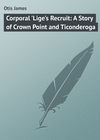Czytaj książkę: «With Porter in the Essex», strona 6
CHAPTER VI
A CALL FOR VOLUNTEERS
Our fears as to what fate might overtake the Essex while we were away and she had only four men to care for her, were forgotten in a great measure as we neared the Britisher.
Probably the question in the minds of all was as to whether the stranger would show fight. I know it fully occupied my thoughts; but, greatly to my surprise, I was not very much afraid of what might happen. Perhaps because there were so many things to think about, I gave less heed to the enemy than I would have done under other circumstances.
There is no good reason why I should spin out this portion of the yarn any longer than is absolutely necessary, more especially since there is so much of later happening and greater importance to be set down.
It is enough to say that we approached the enemy in proper fashion, ready for any kind of a scrimmage, and instead of firing a gun he hauled down his colors as the others had done. Cowardly though I was, it disappointed me because these Britishers submitted so tamely.
We now had, as the second prize of the day, the letter of marque ship Greenwich, three hundred and thirty-eight tons burden, carrying ten guns and a crew of twenty-five men.
Captain Porter had taken many chances in sending us all away at the same time, yet by doing so he had gained another prize which, had she been left at liberty, might have worked serious mischief to our merchantmen.
It can readily be supposed that we did not lose any time in getting back to the frigate. Men enough to take care of the prisoners and work the prize were left on board, and the remainder of us pulled to the Essex at full speed, feeling, when we went on deck once more, as if the old ship had escaped some deadly peril.
By the time the remainder of our fleet came up, bringing with them the two boats we had sent out during the night, the Essex was lying alongside two fine prizes which had not cost us a single charge of powder.
We now had four prizes, in addition to the Barclay, and I was arguing with Phil as to how it would be possible to care for them all, and at the same time take any more, when Master Hackett joined us.
"I reckon you lads think the old Essex has got about as much as she can stagger under, eh?" he began; and I repeated to him what Phil and I had been saying.
"I allow we've got a good big job on our hands, lads," the old man said, speaking thoughtfully, as if weighing well every word, "an' now's come the time when Captain Porter is bound to make port. We're feedin' a crowd of men, an' can't do any great amount of work with so many craft to look after."
"Will we go to Valparaiso?" Phil asked, thinking of Benson.
"It's beyond an old shellback like me to say, lad; but if I was the captain of this 'ere frigate, I'd think twice before I poked my nose into that port the second time."
"Why? They treated us well before."
"Ay, an' that's why I'd keep my weather-eye liftin' while we're in these waters. England is a strong nation, an' these 'ere young republics won't dare hold out against her commands very long. There'll be a big lot of kickin' in Great Britain when word is sent there of what we've been doin', an' you'll find that she'll shut every port on the Pacific against us."
I did not fully understand all Master Hackett said; but no particular harm was done because of my ignorance, since it matters little whether a boy aboard ship knows the whys and wherefores of everything.
However, there must have been good reasoning in the old man's words, since Captain Porter did exactly that which Master Hackett would have advised.
When prize crews were on board all our captured ships we were so short of hands that Lieutenant Gamble of the marines was given charge of the Greenwich, because we had no naval officer to put in command, and the entire fleet was gotten under way without unnecessary delay.
None of us on the gun-deck knew for what port we were bound, until the 19th of June, when we ran into the harbor of Tumbez, and came to anchor.
Why it was, none of our old sea lawyers could determine satisfactorily; but not one of the crew was given shore liberty. There was no unusual amount of work to be done on the ships, yet we were kept aboard as close as if there was danger some of us might desert.
The captain went on shore every day to bargain for provisions to be paid for with the money we captured from the Nocton, and boatloads of stores were put aboard this ship or that; therefore it was certain the inhabitants were friendly, or would be so long as our cash lasted.
There was no little amount of grumbling because we were kept so snug; but as a matter of course none of the hard words were spoken where they might be overheard by the officers, therefore nothing came of it.
Five days after we let go our ground tackle three sail were seen standing into the bay, and we were summoned to get the frigate under way, but the order was countermanded when those on the foremost ship lowered a boat as if to come ashore.
Captain Porter waited to learn who the visitors were, and soon we had the great satisfaction of seeing Lieutenant Downes in the stern-sheets of the boat, although it puzzled us not a little as to why he had returned thus soon.
Of course the lieutenant came on board the Essex, as did those who had manned his boat, and we of the gun-deck heard the whole story of the Georgiana's adventures while Mr. Downes was having his confab in the cabin.
And what a story it was! We cheered and yelled as our old shipmates spun it off, and nearly went wild with rejoicing.
Here is the yarn boiled down, and that it was true we knew full well, for yonder were the prizes coming to close under the Georgiana stern.
It seems that after leaving us Lieutenant Downes cruised off James's Island, where he fell in with two Britishers. Hoisting the English colors, he soon had the captains of the whalers sitting comfortably in his cabin, and then he told them who he was. Well, the prizes were taken without resistance, as a matter of course, and the United States entered into possession, less what prize money would be coming to us, of the ship Catherine of two hundred and seventy tons burden, carrying eight guns and twenty-nine men, and the Rose, two hundred and twenty tons, eight guns and twenty-one men.
After manning these prizes, Lieutenant Downes had only twenty as a crew all told, and yet that fact did not prevent him from giving chase next day to the whaler Hector, a ship of two hundred and seventy tons, twenty-five men, and carrying eleven guns, although she was pierced for twenty.
This last craft was a Britisher who stood ready to fight, and when Mr. Downes understood that he had an action on his hands, with hardly men enough to work his ship, he put the prisoners in irons so that they might not be able to lend a hand to their countrymen.
When the Hector was ordered to surrender she refused, and Mr. Downes let her have a broadside which brought down her main-topmast. The crew had good pluck, however, and fought their ship until nearly all her standing and running rigging was shot away, when they could do no less than haul down their colors. The Britishers had two men killed and six wounded.
After putting a prize crew on board this last capture, Lieutenant Downes had but ten men left in the Georgiana, and, including the wounded, he held seventy-three prisoners. Now it seems that the Rose was an old tub of a ship which it wouldn't pay to bring into port under the circumstances; therefore he threw her guns overboard, and filled her with the prisoners, on condition that they head direct for St. Helena.
When that had been done he steered for Tumbez, for it appears that he and Captain Porter had agreed to go there when it was necessary to make a port.
Now our fleet consisted of nine sail, and it began to look as if we might take possession of every port in the Pacific Ocean, if we were so minded. The beauty of it was that all our ships and ammunition had come from the Britishers, which was surely an economical way of carrying on a war.
Even Phil and I were puffed up with pride because of what had been accomplished, and we crowed as loud as any man on the gun-deck when we went over and over again the "luck of the Essex."
We soon learned that the fleet was not yet to the captain's liking, and on the morning after the arrival of Mr. Downes our people set about making a change.
The Atlantic, which, as you will remember, we captured just before running for Tumbez, was an hundred tons larger than the Georgiana, and had shown herself to be a better sailer, as well as possessing superior qualifications for a cruiser; therefore Mr. Downes and his crew were transferred to her. Twenty guns were mounted in this new sloop of war, and she was manned by sixty men. Her name was changed to Essex Junior, and a right trim little ship she was, I can assure you.
The Greenwich we made over into a store-ship, and all the spare stores of the other vessels were put into her. She was armed with twenty guns, but had no more of a crew than was absolutely necessary to work her; therefore we could not count that she would do much in the way of making prizes.
The carpenters were yet busily at work on the Essex Junior when we left port; but we had become accustomed to fitting at sea, therefore a little thing like that did not disturb the most nervous.
A brave show we made as we passed out of the harbor with the stars and stripes floating in the breeze, and I would have given half my share of prize money if the people at home could have seen us, and known how this squadron had been gotten together.
We were yet at sea on the Fourth of July, and then was held a Yankee celebration which must have astonished the mermaids. Every ship fired a salute, and, what pleased us most, did it with powder we had taken from the Britishers. We had plum duff till we could eat no more, to say nothing of roast pig, vegetables, and other such cabin stores as tickle the appetite.
Phil and I had by this time come to believe we were quite brave, and counted on the moment when in action we should do that which would cause Captain Porter to praise us from the quarter-deck in the presence of all the ship's company.
On the 9th of July the Essex Junior was in good sailing trim, and the fleet was hove to in order to part company with the new sloop of war. Our commander had decided to send the prizes, Hector, Catherine, Policy, and Montezuma, as well as the recaptured ship Barclay, into Valparaiso, and Commandant Downes was to take charge of the matter.
We parted company about noon, the frigate, with the Greenwich and Georgiana, remaining hove to until the Essex Junior and her convoy were hull down in the distance, after which we squared away for a cruise among the Gallipagos, so the marines who had stood guard in the cabin reported; but we knew that between where we then were and the islands in question was a good chance of taking more prizes, and, because of the "luck of the Essex," reckoned on adding to our list of captures before arriving at this new cruising ground.
We counted on having our average good fortune; but never dreamed, confident though we were, of the success which was so soon to be ours.
Four days after we parted company with our prizes and the Essex Junior, that is to say, on the 13th day of July, the lookouts sighted three sail off Banks's Bay, all on a wind, but a good deal separated.
Phil and I were no longer excited by such information. Both of us felt elated; but we had thus far captured everything which had been sighted, and when a sail was reported, we of the gun-deck at once reckoned her as a prize. Had we failed to take two or three craft during our cruise, then we would have been in suspense until the chase was ended; but so good had been our fortune that the worst grumblers among the crew began to find fault because the Britishers fell into our hands like over-ripe apples.
Our little fleet was in a bunch, hardly more than a quarter of a mile separating each craft, when the word was given that more ships had come up to be captured; and on this day we had an opportunity of learning how well the squadron could manœuvre.
Captain Porter signalled that he would give chase to the ship in the middle of the line, which was farthest down to leeward, while the Greenwich and the Georgiana endeavored to cut off one of the others.
This race was different from others which had fallen to our lot, inasmuch as we were eager to know what was going on astern as well as ahead; and every man jack of us off duty gathered on the forecastle-deck, confident that all three of the strangers would be taken, but curious as to how it might be done.
We of the frigate overhauled our portion of the chase rapidly; but the stranger was so far to leeward that we were forced to run a long distance from our consorts, and when the Essex was a couple of leagues off, those who were watching astern could see that one of the strangers which we had left for the Georgiana and the Greenwich to look after, had tacked, and was evidently manœuvring to cut the Georgiana out.
Now had matters become interesting for a verity. Short-handed as our consorts were, there was a good chance that one would be captured while we were running to leeward, and I literally held my breath in suspense, expecting each moment to see the tiny wisp of red and white which we knew to be the stars and stripes, hauled down in response to the stranger's threats.
If any proof had been needed that Yankees were not inclined to surrender without a fight, we had it then, when we saw the Greenwich heave to, take a portion of the crew from the Georgiana, and bear boldly down on the enemy.
What a cheer went up from our men when this had been done! I was proud of my countrymen then, and could have hugged every old shellback on board the Greenwich with a good zest, had it been possible to get at them.
"I'll answer for it that our comrades hold those two Britishers in check until we can get back," Master Hackett said in a tone of satisfaction, and again we cheered until those on the ship we were overhauling so rapidly must have heard and wondered why we were making such a fuss about the capture of a whaler.
Well, we bore down on the chase hand over hand, and when we were so near that a shot might have been pitched into any part of her, the ship hove to without the slightest show of resistance.
Captain Porter hailed as the British colors were hauled down, and then we learned that this last prize was the English whaler Charlton, two hundred and seventy-four tons, with ten guns and twenty-one men.
Her officers were transferred to the Essex, a prize crew was thrown on board in a twinkling, and the frigate hauled her wind to take care of the others.
Captain Porter was so eager for information that he questioned the captain of the Charlton on the quarter-deck, and many of the gun-deck inquisitives heard the whole story.
By this means our commander learned that the largest of the ships we now counted on taking was the Seringapatam, three hundred and fifty-seven tons, carrying fourteen guns and forty men. It was this craft which had been manœuvring to cut out the Georgiana, and unless we had been near at hand to lend assistance the job might have been done.
The other Britisher was the New Zealander, of two hundred and fifty-nine tons, eight guns, and twenty-three men.
The Seringapatam had been built for a cruiser, so our prisoners said, and was the most dangerous ship, so far as the American trade was concerned, of any craft west of Cape Horn.
There was not one of us who did not feel the most intense desire to capture this craft, and particularly to do so before she could work any serious damage to our consorts.
We could see that the Greenwich had already gone into action with the Britisher, and we cheered ourselves hoarse by way of encouragement to the brave fellows who had tackled a craft heavier than themselves, although there was not the slightest chance they would hear our cries.
Our ship, meaning the Greenwich, was manœuvred beautifully; she poured in three broadsides before the enemy could get into position to fire one, and we were yet more than a league distant when the Britisher showed that she had had enough. As her colors came down we cheered and shouted like wild men, some of the old shellbacks dancing around the deck like apes who have suddenly gone mad; but before many minutes passed we saw that we had begun our rejoicings a trifle too early.
After giving token of surrender the captain of the Seringapatam evidently thought he yet had an opportunity to escape, for he slipped off to windward before a prize crew could be thrown on board.
We gazed in breathless suspense as the Greenwich, never stopping to pick up the crew in the two boats which had been lowered to take possession of the prize, crept up on the enemy's quarter and poured in such a fire as was most surprising, considering the number of men which were left on board.
The Britisher soon came to understand that we Yankees were too much for him, even though he outclassed us both as to metal and men, for he wore around and came down to us as meekly as any lamb.
Captain Porter lost no time in throwing a prize crew on board, after transshipping the officers, and away we went for the New Zealander, who was doing her feeble best to crawl out of the way; but succeeding very badly.
When we passed within half a mile of the Greenwich our crew lined the yards and gave her the heartiest of salutes, while Captain Porter winked at the performance when he should have reprimanded us severely for daring to do so without permission or orders.
The New Zealander was taken without opposition, and again we found ourselves with more prizes and prisoners than could conveniently be managed.
Before nightfall Captain Porter learned that the commander of the Seringapatam had taken one prize illegally, he having no letter of marque; and since this was neither more nor less than piracy, the venturesome Britisher was put in irons to be sent home for trial.
Next morning the Charlton's guns, ammunition, small arms, and spare sails were taken out; all the prisoners were put on board, and she was allowed to make sail for Rio de Janeiro, every man jack being under parole to go to that port and none other.
Hardly had she filled away on her course than we set to work putting the Seringapatam into shape for our own use. The guns of the New Zealander were mounted in her, which brought up the number to twenty-two, but we could leave on board no more than a sufficient crew to work her.
Then orders were given that the oil which we had taken, and which was stored on the Essex, the Greenwich, and the Georgiana, should be put on board the latter ship, and she sent home.
Loading a ship in mid ocean with such heavy articles as casks of oil, is a slow and laborious task, as we soon learned. It was necessary to sling each hogshead into a boat, pull to the craft which was being loaded, and there hoist it inboard, working disadvantageously all the while because of the heavy swell.
It was not until the 24th day of July that the Georgiana was ready for the voyage to the United States, and then the captain of the Seringapatam had been sent on board as a prisoner to be closely guarded; but no crew selected to take charge of her.
On this evening our men, greasy and stained with their work of handling oil, were called amidships while Captain Porter stood on the break of the quarter.
All hands knew that we were now to learn who would sail in the Georgiana, and each man looked at his neighbor to know how he felt about going home while the most dangerous portion of the work yet remained to be done, which would be when the British men-of-war came around the Horn to wind up our career.
The captain began by reminding us that our term of service had nearly expired, and that a certain number must be sent home to work the Georgiana.
"I will give you all the same show," he said; "and if too many volunteer to make up the crew, we will take those whose time of enlistment is nearest at an end. You are to think it over this evening; try to settle the matter among yourselves; but if that can't be done, I will take a hand at it to-morrow morning."
With this we were dismissed, and once all hands were on the gun-deck, with the exception of those who remained above on watch, a most tremendous jawing was begun. Every man tried to speak at the same time, and the uproar was so great that no single word could be distinguished. I could not make out whether the men were excited lest they should not be able to go, or if there was a desire to remain.
Phil and I went into a corner by ourselves, where we could hear each other speak, and there I asked him what he thought about volunteering for the Georgiana.
"I count on staying here, if Captain Porter don't drive me out," he said emphatically, thus showing that his decision had been made before we came below. "You know, Ezra, that I don't amount to much when it comes to a show of bravery; but I'm not such a coward as to turn now, when the greatest danger is yet to be met."
I flung my arms around the dear fellow and kissed him on both cheeks. He had spoken that which was in my own heart, although I could not have put it in such proper words; and then it was decided between us that we would remain by the Essex so long as should be permitted us.
By the time we two had settled the question, Master Hackett had succeeded in quieting the wranglers sufficiently to make himself heard, and the old man proved to be quite a dandy at handling a meeting.
"Hold your jaw, you lubbers!" he shouted with such a volume of sound that he must have been heard distinctly by those on the quarter-deck. "The captain wants to know how many of us is achin' to get home before the Britishers send half a dozen frigates down here to blow us out of the water, an' he'll never get the information unless you settle down into peaceable sailormen. There's no use waggin' your chins over this thing; every man has a right to do what pleases him best, an' now he's got a fair chance. What I say is this: Let them as want to go aboard the Georgiana toddle to the port side, and them who count on holdin' by the old hooker, step over to starboard."
The men looked around curiously for an instant, and then every one of them moved to starboard, Phil and I among the rest.
There was a broad grin on Master Hackett's face when he cried with a semblance of anger: —
"This 'ere won't do at all. Some of us are bound to go, seein's how we can't let that cargo of oil run to waste. Of course I'll hold to the frigate; but them as have got wives an' children ashore ought 'er get over to port, an' we'll feel no shame for 'em, knowin' as we do that a crew must be made up for the Georgiana."
"It's none of your business how many wives or children we've got, Hiram Hackett!" one of the throng shouted. "It's as much our right as yours to stick to the frigate, an' we count on doin' it. Why not send the boys? They can do the work of sailormen aboard the Georgiana! Then you'll have two towards a crew."
"Come here, you skulkers!" Master Hackett roared, looking at Phil and me, and there was nothing for it but to step out from among the crew.
"Act as spokesman, Phil," I whispered. "You can go ahead of me when it comes to jawing; but remember that they can't drive us off unless the captain gives the word, and I'm thinking that my cousin Stephen will stand up for our rights."
"Are you two infants ready to obey orders an' go aboard the Georgiana?" Master Hackett asked, looking as fierce as if he counted on eating us.
"No, sir!" Phil shouted at the full strength of his lungs. "We've got as much right to stay as you have, an' we won't volunteer!"
"Three cheers for the infants!" some one shouted, and the men yelled until their throats were like to split.
Then the crew crowded around Master Hackett, each man trying to make himself heard, and I understood that there was little chance of finding a crew for the Georgiana if every one was to do as he pleased.
By this time the noise was so great that Lieutenant McKnight was sent below to learn whether or no a riot was in progress, and, luckily, I succeeded in gaining speech with him before the men knew he was on the gun-deck.
"Surely you will stand our friend in this matter, Cousin Stephen," I said, clutching him by the coat-sleeve without regard to the proprieties; for it is looked upon as insubordination for a common sailor to lay hold of an officer.
"In what way, Ezra? Are so many eager to see home again that you fear there'll be no room for you?"
"It's just the other way, sir," Phil broke in. "Not a man will volunteer, and some of them have said that we two lads must go whether we like it or not."
"It isn't right to force us because we are lads!" I cried. "We've done our duty so far as we knew, and our age shouldn't give license for injustice!"
"See here, my lads, you're not looking at this matter in the proper light. We shall soon be turning and twisting to get out of a British frigate's way, and many of us will lose the number of his mess before the Essex doubles Cape Horn again. You can go now without being called a coward, and it's far better to get out of the scrape while affairs are flourishing as they are at present."
"Are you going in the Georgiana, Cousin Stephen?" I asked.
"What? Me? Never, unless the captain gives a positive order to that effect."
"If you are allowed to remain, why should we be forced to go?"
He turned from me quickly, and, without making any attempt to restore order, went on deck.
The men jawed and argued more violently than ever after my cousin disappeared, and very soon the master-at-arms came below with an order for every man jack of us to show himself abaft the mainmast.
We found the captain waiting for us as before; and although there was very good reason why he should read the riot act because of the uproar, I understood by the expression on his face that he was well pleased the men had not shown a willingness to leave the frigate.
When all hands had quieted down once more he made a little speech in which he thanked us for being so eager to stay by the Essex, and declared that he felt proud of every old barnacle there; but at the same time it was absolutely necessary a crew be sent on board the Georgiana.
"Those men who have families must go," he said finally, after declaring that it had become necessary for him to settle the matter, since the crew themselves could not. "A list shall be made out of such as have others depending upon them, and it will then be posted on the gun-deck. Abide by my decision as you ever have, and I will make it my solemn duty to let the people of the United States know that those who returned in the Georgiana did not do so of their own free will."
We were sent below once more, and Phil and I felt well content, for by the captain's ruling we could not be sent home in the oil-laden craft.



















